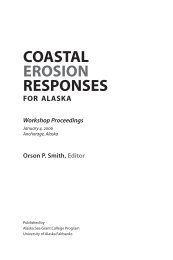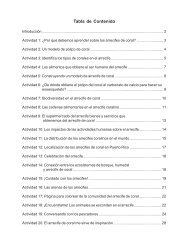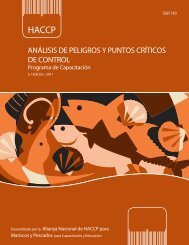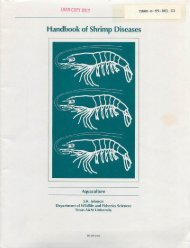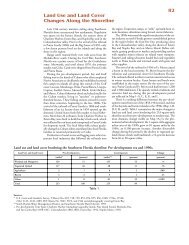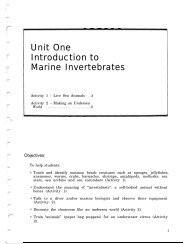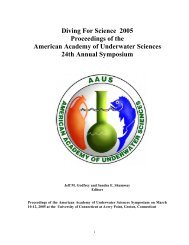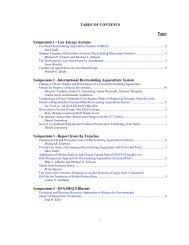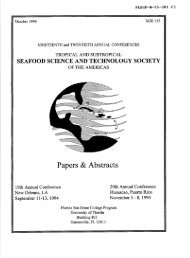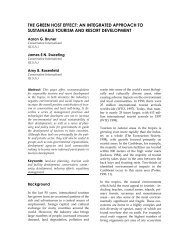Full document / COSOC-W-86-002 - the National Sea Grant Library
Full document / COSOC-W-86-002 - the National Sea Grant Library
Full document / COSOC-W-86-002 - the National Sea Grant Library
- TAGS
- nsgl.gso.uri.edu
You also want an ePaper? Increase the reach of your titles
YUMPU automatically turns print PDFs into web optimized ePapers that Google loves.
694<br />
vlth radvastes; and (3) incineration of wastes at sea, such as what has<br />
been done with certain hazardous chemicals.<br />
In <strong>the</strong> United States today about 10 percent of all waste products<br />
find <strong>the</strong>ir way into <strong>the</strong> ocean. The types of materials thus disposed of<br />
range from dredge spoils, which represent about 80 percent of what we<br />
dump in <strong>the</strong> ocean, to radioactive wastes, of vhlch <strong>the</strong>ro is currently<br />
no disposal in United States waters.<br />
Between 1946 and 1970 some 90,000 drums of low-level radvastes<br />
were dumped into tho ocean by U.S. vessels, not far from U.S. coasts.<br />
The entire quantity dumped in those 25 years is today exceeded every<br />
year by European nations that dump radvastes at a single site 550 miles<br />
off England. The U.S. virtually abandoned its dumping program in <strong>the</strong><br />
early 1960s, and nothing whatever has been dumped since 1970. This<br />
cessation vas more due to economic than safety reasons.<br />
Ocean dumping vas not regulated until 1972 when Congress passed<br />
<strong>the</strong> Marine Protection, Research and Sanctuaries Act (33 U.S.C.<br />
{11401-1444) popularly called <strong>the</strong> Ocean Dumping Act. The Act prohibits<br />
marine disposal of "high-level" radvastes, but glvos to <strong>the</strong><br />
Environmental Protection Agency power to regulate <strong>the</strong> dumping of<br />
"low-level" radvastos. The Act was passed to implement <strong>the</strong> 1972 Ocean<br />
Dumping Convention, concluded in London in 1972 and to which <strong>the</strong> U.S.<br />
is a party. (2 U.S.T. 2403, T.I.A.S. No. 8165 (done Dec. 29, 1972;<br />
entered into force Aug. 30, 19751). Both <strong>the</strong> Act and Article IV(l)(a)<br />
of <strong>the</strong> Convention prohibit dumping of "dangerous" wastes into <strong>the</strong> ocean<br />
and provide for licenses to dump o<strong>the</strong>r vastcs. Nei<strong>the</strong>r, however,<br />
prohibits emplacement of wastes beneath <strong>the</strong> seabed.<br />
The historical trend has been to dispose of wastes in ever more<br />
remote areas. In <strong>the</strong> future, as near-coastal areas are increasingly<br />
stressed by population growth and resulting decline in water quality,<br />
and as land disposal sites become lass available and more expensive,<br />
pressure to dispose of wastes in <strong>the</strong> deep ocean will Increase.<br />
Policy Analysis vs. Ethical Analysis<br />
If <strong>the</strong> foregoing is so, it becomes essential to examine more<br />
closely <strong>the</strong> policy and ethical lasuea involved. A vast body of<br />
literature deals vlth scientific or policy analysis of <strong>the</strong> Issues of<br />
deep-ocean dumping. Virtually none exists that deals vlth ethical<br />
analysis. What is tha difference? Policy analysis la different from,<br />
and ostensibly does not include, ethical analysis. Policy analysis is<br />
concerned with what is possible, expedient, politically attainable and<br />
cheap. Ethical analysis is concerned only with what is "right." It is<br />
rarely used in official determination of public policy—at least in<br />
environmental matters. Instead, it is an individualistic pursuit,<br />
usually <strong>the</strong> domain of persons and organizations that seek to express<br />
<strong>the</strong>ir opinions on <strong>the</strong> "morality" of government policy. Indeed, an<br />
unusual degree of concern with <strong>the</strong> "rlghtnoss" of a policy decision on<br />
<strong>the</strong> part of a policymaker is often viewed as naive. From <strong>the</strong> nature of<br />
<strong>the</strong>ir work, most public officials have come to believe that consensus<br />
on ethical choices is not possible in a pluralistic society like ours.<br />
Many believe this is <strong>the</strong> way it should be: The government bos no<br />
business meddling In people's ethical beliefs or upholding <strong>the</strong>m.<br />
Ethical debate la thus discouraged In public meetings, probably because<br />
of <strong>the</strong> widespread but mistaken belief that ethical concerns are




